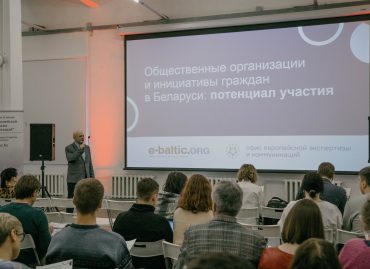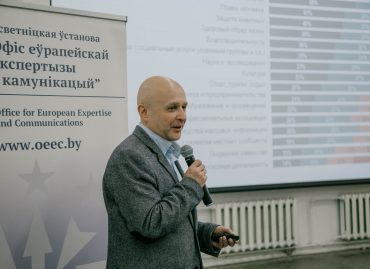by Valeria Volkogonova, Local Correspondent from Belarus and Alexandra Savinich (Office for European Expertise and Communications).
Why is it better to engage eco-activists in the Belarusian countryside?
 We discussed these and other issues with Mikhail Doroshevich, the Executive Director of Baltic Internet Policy Initiative.
We discussed these and other issues with Mikhail Doroshevich, the Executive Director of Baltic Internet Policy Initiative.
In June-October, 2019, the Baltic Internet Policy Initiative and the Office for European Expertise and Communications conducted a survey of Belarusian Internet audience “Civil Society Organizations and Civic Initiatives: the Potential for Engagement”.
Its purpose was to understand why and in what kind of activities citizens participate or potentially ready to participate. The data appeared to be unexpected.
Why do we need surveys of civil society at all?
Mikhail Doroshevich:

“Surveys are necessary as they provide reliable data on the current situation. Let’s assume that we have found out that 50% of people aged 15-24 like coffee. Hence the question: what do the remaining 50% like? This gives rise to further research. Thus, surveys help us to see what can be studied further and more thoroughly.
The same holds true if we conduct surveys of civil society organizations and civic initiatives. First of all, the data are necessary for the organizations and initiatives themselves so as they were able to understand how to work with people: how to engage them, how to choose the best ways to present themselves, how to get people interested and give them the opportunity to participate.
For instance, we found out that more than 80% of respondents consider ecology the most important area of civic activities. Approximately the same share of respondents stated that they are ready to take part in the activities of eco-organizations and initiatives.
This means that environmental organizations can now engage even more people in their activities. How to do this better is another issue. The most important thing is that people consider the topic important and are ready to participate”.
Where can we find eco-activists? In rural areas, among young people!
“During the presentation of our findings in Minsk, one of the environmental activists asked us a question: where are they, these people who are ready to participate in our activities?” recalls Mikhail. (from the survey: 44% are definitely ready to take part in eco-organizations, and 34% are somewhat ready to do this – Ed.)
 “Our hypothetical answer was this: one should look for eco-activists in the village among youth. It is because our data show that people aged 15-24 in rural areas are those most interested and ready to participate in civic activities.
“Our hypothetical answer was this: one should look for eco-activists in the village among youth. It is because our data show that people aged 15-24 in rural areas are those most interested and ready to participate in civic activities.
While trying to attract people, one should deliver information correctly: by explaining how and in what way the people can be helpful, what results can be achieved through activities. It is important that civil society organizations do not turn into sects,” says Mikhail. “After all, the number of participants is not an end in itself. People need to be educated.
Indeed, 57% of the respondents when answering the question “What prevents you from participating in organizations?” have chosen “No one asked me, no one invited me.” Another 59% replied, “I don’t know exactly how I can participate (where to go, where events are held).”
 Does it mean that all the citizens will be participating in CSOs and civic initiatives in the future?
Does it mean that all the citizens will be participating in CSOs and civic initiatives in the future?
“We cannot say that only CSOs are our future because no one has cancelled governmental agencies and self-interest of individuals too,” says Mikhail. “The national authorities monitor the overall situation in the country, while the local authorities have a narrower field – they monitor only their region. And they all answer the needs of citizens the way they understood these needs, they do what they think would be better for the majority.
Public organizations are important for diverse communities with various interests. So that they could influence the decision-making processes. The ideal situation is when civil society organizations are well-informed and are fully and effectively engaged in these processes.
If the state has a developed and strong civil society, the country becomes more advanced in all areas: economics, politics, and education etc.
The full version of the survey you can find here.
This article was produced by Valeria Volkogonova and Alexandra Savinich in the framework of the EU-funded ‘Eastern Partnership Civil Society Facility – Regional Actions’ Project. Its contents are the sole responsibility of its authors and do not necessarily reflect the views of the European Union or the Project.
Read more about our local correspondents here.




